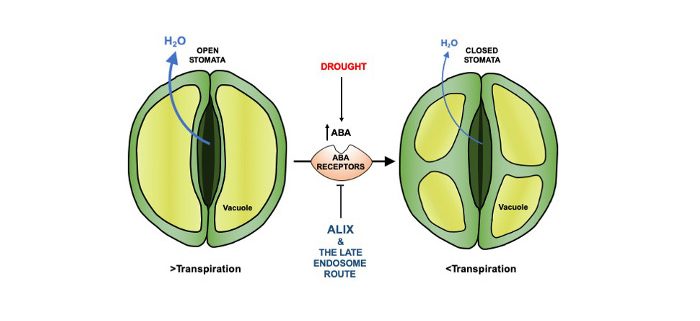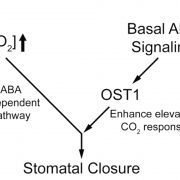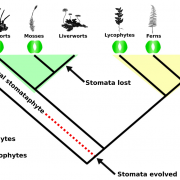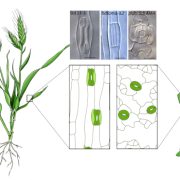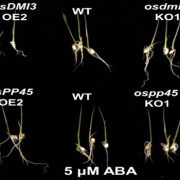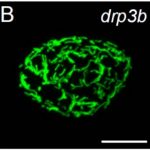ALIX helps to open the pore
García-León et al. reveal a function for a trafficking protein in stomatal aperture regulation.
Plant Cell https://doi.org/10.1105/tpc.19.00399
By Marta García-León and Vicente Rubio
Centro Nacional de Biotecnología (CNB-CSIC) Darwin, 3. 28049 Madrid, Spain
Background: Plants protect themselves against drought stress by closing their stomata, small pores in leaves and stems that control water transpiration and gas exchange. This process is mediated by the plant hormone abscisic acid (ABA), which is produced under dry conditions and triggers stomatal closure, limiting water loss. ABA also represses plant growth and development, which reduces water use. Increases in ABA levels are perceived by ABA receptor proteins, whose abundance and activity are tightly regulated by different mechanisms that allow plants to quickly respond to changes in water supply. One of these mechanisms involves the late endosome route that mediates trafficking of membrane-associated proteins to the vacuole where they can be degraded.
Question: We wanted to know whether ALIX, a protein involved in trafficking of membrane-associated proteins, also targets the ABA receptors for vacuolar degradation as a means to regulate plant responses to ABA, including stomatal closure and water use efficiency.
Findings: In a search for Arabidopsis thaliana proteins that interact with ALIX, we identified several members of the PYR/PYL/RCAR family of ABA receptors. Indeed, ALIX directly binds these ABA receptors in late endosomes and mediates their trafficking to the vacuole where they are degraded. Accordingly, impaired ALIX function leads to increased accumulation and activity of ABA receptors, which reduces plant growth and leads to stomatal closure. Therefore, ALIX helps to moderate ABA perception and signaling in plants to reach an adequate regulation of plant responses to ABA, including control of stomatal aperture.
Next steps: Interestingly, ABA itself promotes vacuolar degradation of specific ABA receptors, pinpointing to a negative feedback mechanism that modulates plant responses to this hormone. Understanding how ABA promotes degradation of certain ABA receptors but not others will shed light on the complex mechanisms governing plant growth in response to water availability. Furthermore, engineering plants that express modified versions of ALIX that can fine tune the stomatal aperture should help improve water use efficiency and crop productivity.
Marta García-León, Laura Cuyas, Diaa Abd El-Moneim, Lesia Rodriguez, Borja Belda-Palazón, Eva Sanchez-Quant, Yolanda Fernández, Brice Roux, Ángel María Zamarreño, José María García-Mina, Laurent Nussaume, Pedro L. Rodriguez, Javier Paz-Ares, Nathalie Leonhardt, Vicente Rubio. (2019). Arabidopsis ALIX Regulates Stomatal Aperture and Turnover of ABA Receptors. Plant Cell; DOI: https://doi.org/10.1105/tpc.19.00933
Key words: abscisic acid receptor, ALIX, protein trafficking, stomata


